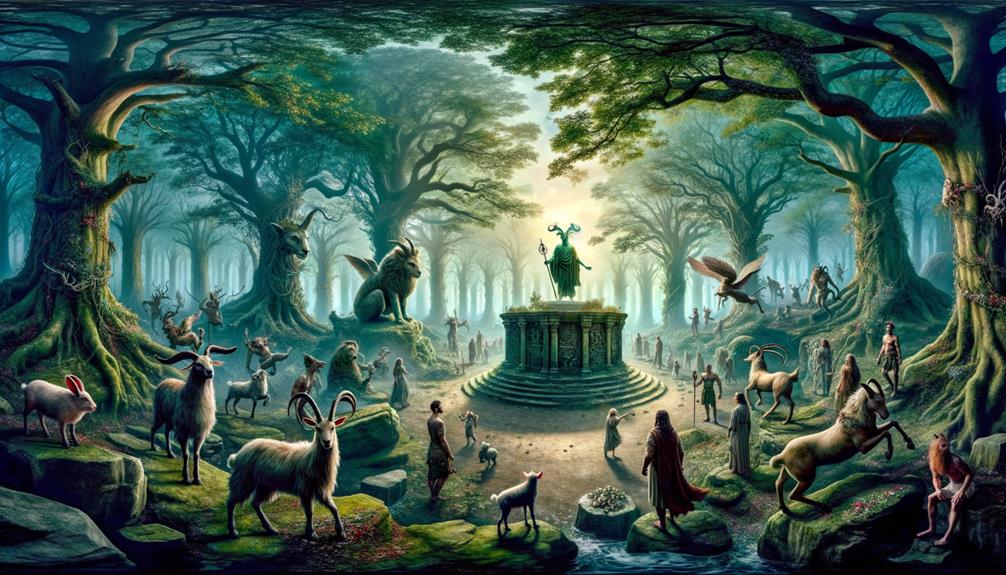Not many realize Faunus, the Roman nature god, portrayed the benevolent protector as well as the enigmatic trickster. Delving into his mythological sacred groves, we uncover stories where mortals sought his prophetic visions, craving prosperity. One tale recounts a humble farmer who, after a haunting dream sent by Faunus, stumbled upon a hidden spring that transformed his barren land into a lush paradise. But these legends hold more than just blessings; they reveal secrets that challenge our comprehension of nature's duality and the delicate equilibrium between chaos and order.
Origins and Mythology
From ancient Italian woodlands emerged Faunus, a mythical guardian spirit embodying nature's raw, fertile power. Picture a half-man, half-goat figure roaming lush meadows and dense forests, nurturing life around him. Deeply rooted in Roman mythology, Faunus evolved from a simple provider of agricultural bounty into a formidable woodland deity.
Examining his stories, parallels arise with the Greek god Pan – both representing untamed nature through their haunting melodies. Yet Faunus held a unique gift of prophecy, his wisdom sought amidst rustling leaves and murmuring streams.
Each February, Romans celebrated Faunus during Lupercalia, a festival driving away malign spirits through rituals and revelry. His enduring image as a horned nature protector profoundly shaped Roman art, literature, and religious practices. Faunus, symbolizing nature's unrelenting spirit, continues captivating imaginations today.
Faunus and Pan
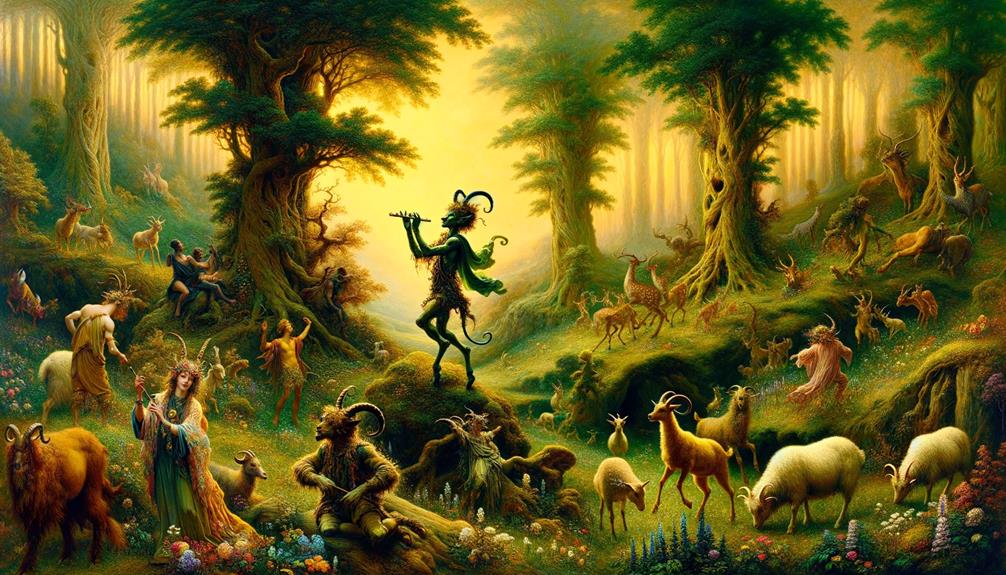
Weaving through ancient myths, the spirits of Faunus and Pan embodied nature's raw power and mystical foresight. These deities, Roman and Greek respectively, shared a deep bond with the wild, often depicted with goat features symbolizing fertility and untamed landscapes. Their influence transcended the physical realm, guiding mortals through prophetic visions.
At the core of their legacy:
- Embodying Nature's Abundance: Both represented the earth's fertile forces and rugged wilderness.
- Oracular Guidance: They served as conduits for divine insights into the future.
- Cultural Merging: As traditions blended, Faunus became associated with the Greek Pan.
- Celebratory Festivals: Events like the Lupercalia honored their roles in agriculture and revelry.
Through myth, Faunus and Pan endure as guardians of nature's secrets and harbingers of future events. Their stories remind us of the delicate equilibrium between civilization and the wild—a balance that shapes our understanding of the natural world around us.
Tales and Legends
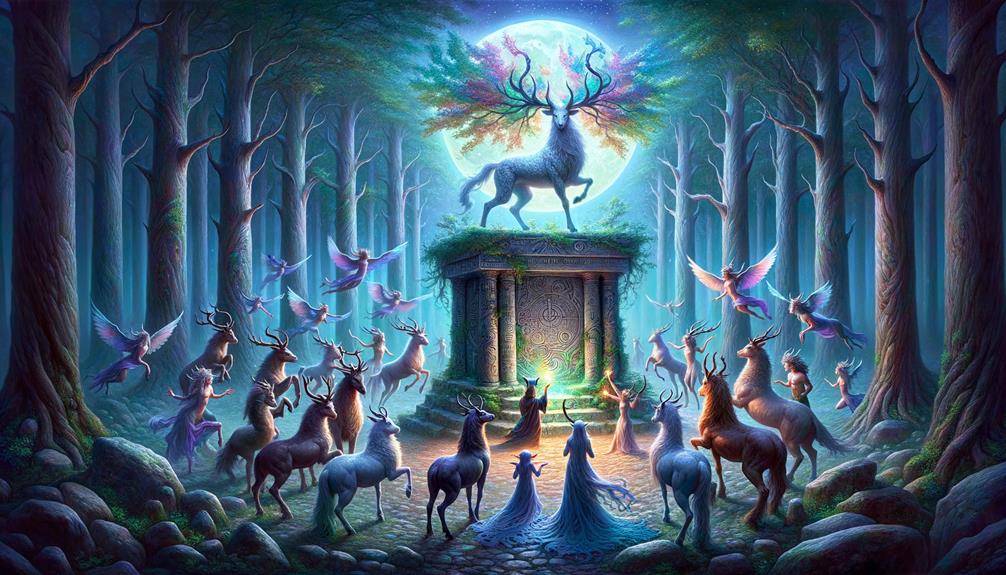
Let's dive into the captivating realm of Faunus, where ancient Roman myths weave nature's wonders with prophetic visions. In these sacred groves, mortals sought Faunus' divine guidance, listening for whispers in the rustling leaves and swaying branches to unravel life's mysteries.
One tale tells of a farmer desperate for a bountiful harvest. Sleeping beneath towering oaks, Faunus appeared in a vision, revealing the path to prosperity. The farmer awoke, faith in the god's wisdom renewed.
The Lupercalia festival celebrated Faunus' guardianship over crops, livestock, and the community's wellbeing. Priests donned goatskins, racing through Rome to drive out malign forces and invoke blessings of abundance. These symbolic rituals honored Faunus' role in ensuring nature's bounty and the people's flourishing.
Festivals and Celebrations
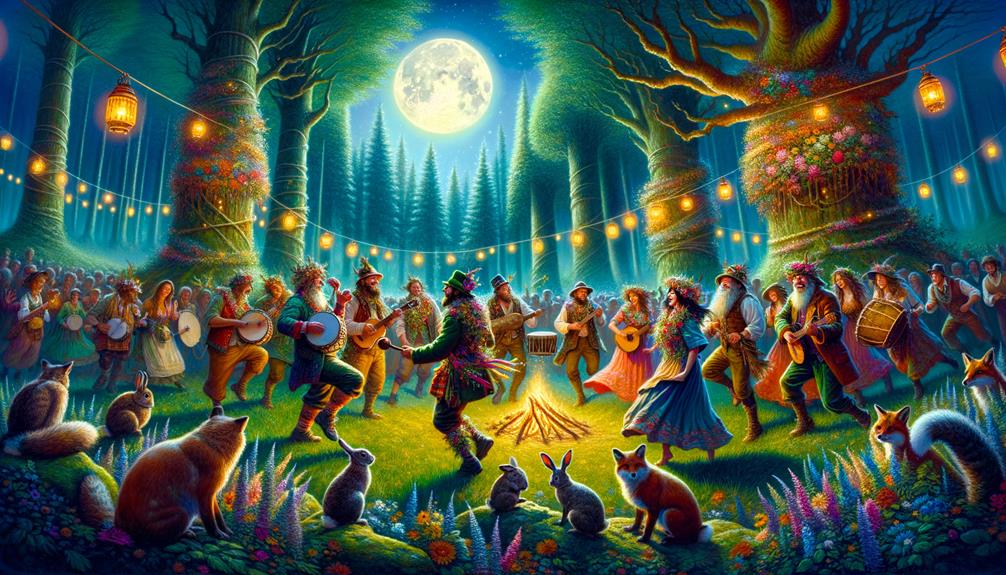
Every February and December, the Faunalia festivals take center stage, celebrating the deep bond between humans and the raw, untamed spirit of nature. These age-old rituals honor Faunus, the Roman god of agriculture and the wild, embodying the intricate relationship between people and the land that sustains them.
Peasants bring offerings to Faunus's temple, a symbolic gesture of gratitude for past harvests and hope for future abundance. Joyful dancing fills the air, a communal expression of life's cycles and the fertility Faunus bestows upon fields and flocks. The temple grounds become a sacred space where the natural world and human devotion intertwine seamlessly.
Celebrants seek Faunus's blessings, invoking his protection and favor for bountiful harvests. These festivals transcend mere reverence; they are a quest for harmony with the forces of nature. The rituals performed echo ancient symbols, reminding participants of their place within the grand tapestry of life. Through Faunalia, Romans reaffirm their respect for the earth, celebrating the enduring presence of Faunus in every seed sown and every harvest reaped.
Influence and Legacy
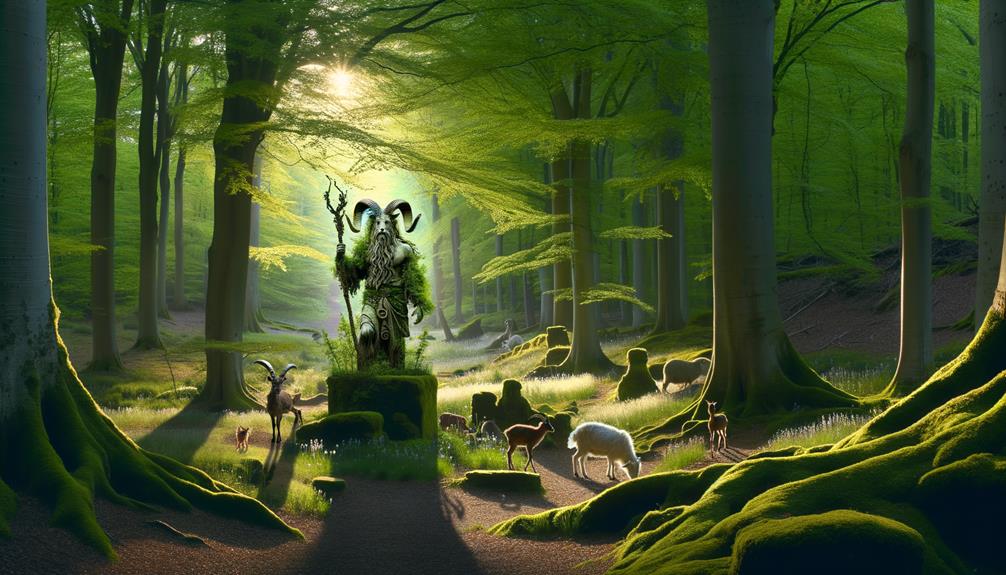
Faunus' legacy permeates Roman culture, infusing art, poetry, and rituals with nature's primal essence and prophecies. He bridges humanity and the wild, a woodland king whispering the earth's secrets to those attuned. Roman art depicts pastoral scenes and entwined human-animal forms, symbolizing our unity with nature.
Poetry reveres Faunus, the muse guiding poets with divine prophecies. The Faunalia festival celebrates our place within the greater cycle of existence through dance, joy, and reverence for the seasons.
Even now, Faunus reminds us humans are woven into nature's rhythms through modern literature and environmental consciousness. His presence evokes our timeless connection to the natural world and its ancient wisdom.
Frequently Asked Questions
What Was Faunus the God Of?
I explored Faunus, the Roman deity associated with nature's abundance. He watched over fields, forests, and rural life, protecting crops, livestock, and wildlife. Farmers relied on Faunus for fertile lands and bountiful harvests. He also possessed prophetic wisdom, guiding those seeking glimpses into the future.
What Does the Faunus Symbolize?
Faunus personifies the intricate relationship between humans and the natural world, a cyclical give-and-take fueled by reverence. This mythical figure represents pastoral guardianship, embodying the ever-evolving seasons and bounties of the earth. His spirit encourages us to appreciate nature's profound gifts and prophecies.
Where Can You Usually Find Faunus?
Faunus often roams untamed forests, surrounded by flourishing plants and wildlife. His presence guides my journey through nature's sacred spaces, a guardian of the wild.
Who Is Faunus Married To?
In ancient Roman mythology, Faunus tied the knot with the goddess Fauna. Their marriage embodied the sacred cycles of nature and abundance, echoing the earth's rhythms.

